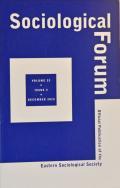
Urban sociology has tended to study interactions between passersby and “street persons” with an emphasis on the ways street persons become bothersome, harassing, or dangerous. This article moves away from the focus on the ways interactions in public go awry and focuses on how individuals account for the mundane, everyday exchanges they have with strangers who seek their help. Based on interview data (N = 31) and qualitative analysis of data from an Internet survey (N = 110), this article suggests that the presence of beggars does not inherently symbolize urban decay to passersby and does not necessarily elicit anxiety, but instead provides a valuable texture of urban life. Further, the article argues that individuals, when justifying their responses to requests for help from needy persons (beggars) in urban spaces, use a variety of cultural strategies to maintain their perception of themselves as moral persons, both when they choose to help and when they refuse. Drawing from these findings, the article suggests that urban sociology and the sociology of risk would benefit from sensitizing their studies of public interactions to the diverse meanings individuals assign to them, rather than presupposing annoyance, anxiety, or fear as their predominant characteristic.